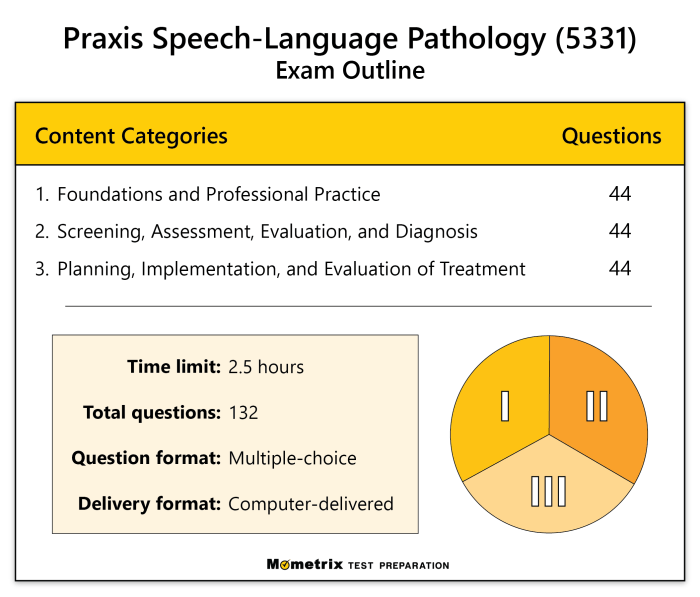Embark on a journey towards Praxis success with our comprehensive Speech Pathology Praxis Study Guide. This indispensable resource empowers you with the knowledge and strategies to excel in this crucial exam, opening doors to a rewarding career in speech pathology.
Our meticulously crafted guide aligns with the Praxis exam blueprint, ensuring you cover all essential content areas with depth and precision. Engage with practice questions, simulations, and effective study strategies that will boost your confidence and prepare you for the challenges of the Praxis exam.
Speech Pathology Praxis Study Guide Overview
The Speech Pathology Praxis study guide is an essential resource for individuals preparing for the Praxis exam. It provides comprehensive coverage of the key content areas tested on the exam, along with practice questions and simulations to help candidates assess their understanding and identify areas for improvement.
Using a study guide offers several benefits, including:
- Organized and structured content that aligns with the Praxis exam blueprint
- Practice questions that mimic the format and difficulty of the actual exam
- Detailed explanations and rationales for correct answers, fostering a deeper understanding of concepts
To effectively utilize a study guide, candidates should:
- Review the content thoroughly, identifying areas of strength and weakness
- Complete practice questions regularly to gauge progress and identify areas for improvement
- Seek clarification from instructors or mentors on concepts they find challenging
Content Coverage of the Praxis Study Guide: Speech Pathology Praxis Study Guide
The Praxis study guide covers the following key content areas:
- Communication Sciences and Disorders
- Assessment and Diagnosis
- Intervention
- Ethics and Professional Practice
The depth and breadth of coverage for each content area is determined by the Praxis exam blueprint. The study guide aligns with the blueprint to ensure that candidates are adequately prepared for all aspects of the exam.
Practice Questions and Simulations

The Praxis study guide includes various types of practice questions, such as:
- Multiple-choice questions
- Short answer questions
- Case study questions
- Simulation questions
Practice questions help candidates prepare for the Praxis exam by:
- Familiarizing them with the exam format and question types
- Identifying areas where they need additional study
- Building confidence and reducing test anxiety
Study Strategies and Resources
Effective study strategies for using the Praxis study guide include:
- Creating a study schedule and sticking to it
- Breaking down the content into smaller chunks
- Using active learning techniques, such as flashcards and practice questions
- Seeking support from peers, instructors, or a tutor
Additional resources that can complement the study guide include:
- Textbooks and journal articles
- Online forums and discussion boards
- Practice exams
Tips for Success on the Praxis Exam

To achieve success on the Praxis exam, candidates should:
- Understand the exam format and time constraints
- Manage stress and anxiety during the exam
- Pace themselves and allocate time wisely
- Guess intelligently if they are unsure of an answer
Query Resolution
What is the purpose of the Speech Pathology Praxis Study Guide?
Our Speech Pathology Praxis Study Guide provides a structured and comprehensive approach to preparing for the Praxis exam, covering key content areas, practice questions, and effective study strategies.
How does the guide align with the Praxis exam blueprint?
The guide is meticulously aligned with the official Praxis exam blueprint, ensuring that you focus on the most relevant and essential content areas.
What types of practice questions are included in the guide?
The guide features a variety of practice questions, including multiple-choice questions, simulations, and case studies, designed to mimic the format and difficulty level of the actual exam.